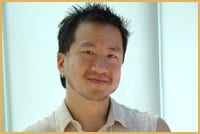After years of contributing to the literary community as a poet and novelist, and to the queer community as an activist, Andy Quan is finally ready to give himself time to stop and breathe.
The Vancouver-born author, whose work includes Calendar Boys, Slant, and, most recently, a collection of poetry entitled Bowling Pin Fire (Signature Editions 2007), has officially become an Australian citizen.
Quan lives in Sydney now, with his partner and his impressive collection of succulents, and despite his incessant cravings for Vancouver’s Chinese food, he’s genuinely happy.
“I’m finally feeling settled,” says Quan in our phone conversation. “I’m in a great place.”
I interpret his statement both literally and figuratively.
Effecting change through action has always been a key motivator for Quan. This is evident in the contributions he has chosen to make. In his writing, he has been candid about his sexuality, the difficulty of coming out, and his struggles with racism in a culture that often denies and perpetuates racial identities simultaneously.
Since his final year in university, Quan has been documenting his experiences and presenting his readers with that signature clarity, humour, thoughtfulness and freshness they have come to expect.
In his earlier work, he muses, he was intent on finding himself. His characters were engaged with self-discovery and everything he wrote was infused with a kind of youthful energy. These days, his writing serves a different purpose. He’s much more accomplished now than he was in his youth and he points out that he has changed. Instead of focusing on getting published, he asks himself what it means to be an author. “What does it mean to write and be creative and thoughtful and introspective?”
Quan introduces more fresh ideas in Bowling Pin Fire in which he traces his childhood memories —from not fitting in with many of the kids at school, his coming-of-age awareness of his sexuality, to his international, substance-induced searching for meaning, belonging and a sense of home. Many have to do with aging —that of his father, his brothers and even himself. The collection reads almost as a memoir in that sense. It tells the story of a boy becoming a man.
In his essay “Gay and Tired” from First Person Queer (Arsenal Pulp 2007), he approaches a subject that is often taboo in activist circles, namely, burning out. In it, he writes empathetically about community cynics —those of us who are “so over” the gay community, in terms of committees and activism, event planning and socializing. Yet he remains optimistic.
“I could never imagine how you wouldn’t want to quietly or loudly state your sexuality, wouldn’t want to change the world, just a little bit for the better.”
Quan derives great satisfaction from having given of himself. Even his website is generous, offering up not only his recent meanderings and freelance articles or reviews and snippets from books, but also family photos and even a few self-deprecating comments about his musical aspirations.
In his personal life, he’s learning to recognize how far we’ve come, learning to enjoy the luxury of being with his partner in a beautiful city, in a beautiful apartment. This is not a cavalier stance about choosing personal comfort to the detriment of social awareness. Quan has put in a lot of years as a community activist, working with AIDS, campus groups and others. And, he’s keenly aware that the fight is far from over.
The struggles that he faces now —Sydney’s struggles —keep him busy, but the author seems to have tapped in to an inner calm that keeps him grounded even as he pushes forward in his public career.
A meaningful reward for Quan is knowing that his work makes an impact and hits home with younger generations. Speaking from his home in Australia, he tells me that the best payoff to the creative endeavour is when he gets a letter or an email from someone “whose path was made just a little easier because of reading something I’ve written.”
Quan’s literary strength has to do with making himself and his experience as accessible as it can be. Of course he writes from a specific identity —growing up Chinese in Vancouver, coming out early on to parents and college friends, and traveling the world.
Not everyone can relate to every experience Quan writes about and that doesn’t seem to bother him at all. He says he was surprised that in Calendar Boys, his coming-of-age novel, he “imagined a world in which straight people would take interest in a coming out story and relate to it on a personal level.” Even though he was writing specifically about his life, he felt like there was a universal applicability that made the story greater than the fact of his sexuality.
Bowling Pin Fire is a fine example of how personal family stories and childhood memories become political when they are articulated in such a way that readers can’t help but be affected. In his poem, “Spit,” Quan tells the story of being seven, driving with his dad when a traffic jam infuriates another driver who then bullies his father, spits on the family station wagon and instigates a fight. Quan writes, “He saw me and let go. Swore one last time. We shut ourselves back in, could not speak, his saliva still not dry, its separate bubbles like sad jewels or the eyes of an insect. I felt your shame, I, who had perhaps saved you, who had caused all this.”
Quan articulates sentiments that we would all do well to hear. Namely, that maturity is sexy. Self-awareness is hot. Comfort in one’s own life and personal relationships and in one’s own self is something that happens over time —with considerable struggle —and it marks our bodies in one way or another.
Growing up is not something we should run away from but embrace and enjoy, just like everything else.

 Why you can trust Xtra
Why you can trust Xtra


